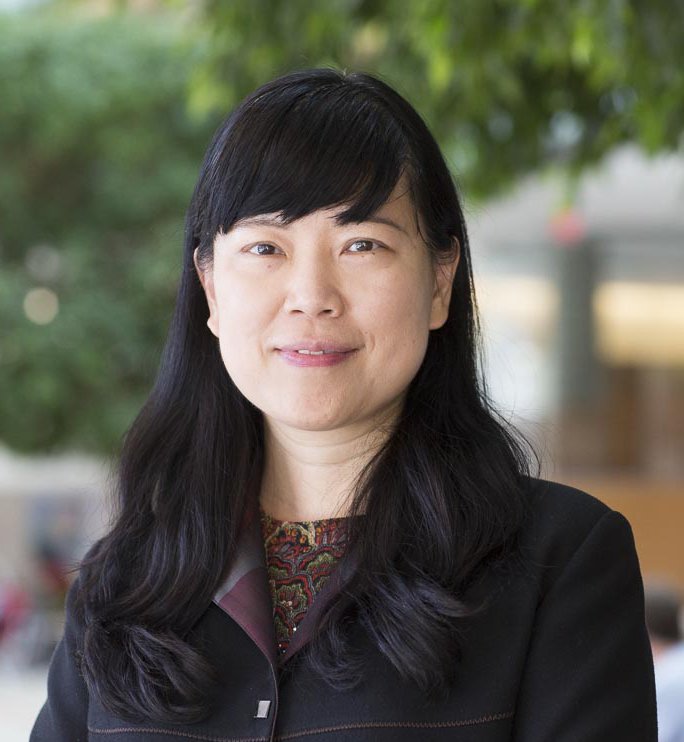Professor Lingjun Li
Professor Lingjun Li
School of Pharmacy and Department of Chemistry
University of Wisconsin-Madison
Abstract
Advancing Biomedical Research via Innovation in Mass Spectrometry (MS)-based Approaches
Comprehensive characterization of all signaling molecules in a biological system with chemical, spatial and temporal information is often critical to deciphering their functional roles, yet it poses a daunting challenge. In this presentation, I will present our recent progress on the development of a multi-faceted mass spectrometry (MS)-based analytical platform to probe neuronal signaling with enhanced sensitivity and selectivity. By combining chemical labeling, micro-scale separation, and tandem MS sequencing techniques, we discovered more than 300 novel neuropeptides in several model organisms. Moreover, both mass spectrometric imaging (MSI) technology and in vivo microdialysis sampling tools have been developed and implemented to follow neuropeptide distribution and secretion with unprecedented details. Additionally, several in situ chemical derivatization strategies have been developed to enable spatial mapping of various biomolecules including lipids and glycans in complex biological samples, such as human cell lines and cancer tissue samples. Recent progress towards single- cell lipidomics enabled by dual-polarity ionization and ion mobility MS imaging will be highlighted as well.
Furthermore, we are developing multiplexed isobaric and isotopic tagging strategies to discover, identify and evaluate candidate biomarkers of Alzheimer’s disease (AD) in cerebrospinal fluids (CSFs) obtained from asymptomatic cognitively-healthy middle- aged adults, older cognitively-normal adults, and patients with mild cognitive impairment (MCI) and AD. A large-scale comparative glycoproteomic analysis via the 12-plex DiLeu (N,N-dimethyl leucine) tagging strategy revealed distinct glycosylation patterns and dynamic changes of certain glycoforms in CSF samples collected from the control, MCI, and AD patients. Additionally, we report on a multiplexed quantitation method for simultaneous proteomics and amine metabolomics analyses via nanoflow reversed phase LC-MS/MS, exploiting mass defect-based DiLeu (mdDiLeu) labeling. Several on-going efforts and future perspectives provided by these enabling technologies will be highlighted and discussed.
Lingjun Li
Dr. Lingjun Li is a Vilas Distinguished Achievement Professor and the Charles Melbourne Johnson Distinguished Chair Professor of Pharmaceutical Sciences and Chemistry at the University of Wisconsin-Madison (UW-Madison). Dr. Li received her Ph.D. degree in Analytical Chemistry/ Biomolecular Chemistry from the University of Illinois at Urbana-Champaign in 2000. She then did joint postdoctoral research at the Pacific Northwest National Laboratory and Brandeis University before joining the faculty at UW-Madison in December 2002. Dr. Li’s research interests include the development of novel mass spectrometry (MS)- based tools such as new isotopic and isobaric labeling strategies that enable hyperplexing for quantitative proteomics, peptidomics, and glycomics, and their applications in neuroscience and cancer research. She and her team also develop microscale separations, in vivo microdialysis and imaging MS tools for functional discovery of neuropeptides in model organisms and (glyco)protein biomarkers in neurodegenerative diseases with a strong focus on Alzheimer’s disease. Her lab also explores novel use of ion mobility MS to address technical challenges in peptidomic research. Professor Li has established a highly productive research program and published more than 400 peer-reviewed research journal papers (with H-index of 64, and more than 15,340 citations) and has given more than 300 invited talks. Dr. Li is passionate about training next generation of scientists and has successfully trained and graduated 65 PhDs and is currently training 25 PhD graduate students, 5 postdoctoral scientists, and 6 undergraduate students. Dr. Li has been recognized with numerous awards, including ASMS Research Award, NSF CAREER Award, Sloan Fellowship, PittCon Achievement Award, and ASMS Biemann Medal, and was named one of the Top 50 most influential women in the analytical sciences in 2016 and was recently featured in the 2019 and 2021 Top 100 Power List by the Analytical Scientist (on a global scale). Dr. Li is currently serving as an Associate Editor for the Journal of the American Society for Mass Spectrometry (JASMS) and sitting on the Advisory Board for Analytical and Bioanalytical Chemistry and Mass Spectrometry Reviews.
Hosted by Professor Varun Gadkari
